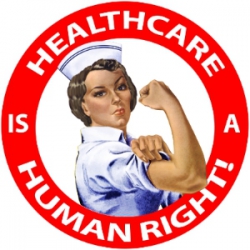Sep
10
2013

Written by Sean Thomas-Breitfeld
This past week, the Building Movement Project Team had the privilege to hear from several leaders in Los Angeles about how the implementation of Obamacare is being leveraged by forward-looking organizations as an opportunity for movement building.
We met at one of St. John’s Well Child & Family Center’s many clinics in South Los Angeles. St. John’s is a nonprofit community health center that BMP profiled in our Catalysts for Change case studies of organizations integrating social change activities into their work. St. John’s Director of Community Relations, Mario Chavez, gave our team a tour of their facilities, explaining how the medical staff and community outreach team work together to ensure that the residents in South Los Angeles have a real right to health. Their model of aligning community organizing and healthcare services is part of a long-standing organizational commitment, but is the wave of the future as more health centers explore how to do effective community outreach (PDF) to enroll the millions of Americans who will become eligible for health coverage through the new health insurance exchanges and Medicaid expansions that were enacted through the Affordable Care Act.
In some ways, it is Obamacare’s enrollment process that creates the greatest opportunity for organizing and movement building. The lessons of labor and electoral organizing (i.e. a focus on metrics, the skill of going door-to-door, etc.) have uniquely positioned community based organizations like South LA’s Community Coalition (CoCo) to organize around the implementation of the ACA. CoCo’s President and CEO, Marqueece Harris-Dawson, explained that the organization is getting out into the community to explain how the expanded eligibility for Medicaid and health insurance apply to the neighborhood’s many low-income residents. But beyond the unprecedented access to quality healthcare that the law will offer people, the enrollment process also gives organizers an opportunity to demonstrate real tangible benefits of policy change.
Too often, policy debates in Congress don’t seem relevant to people’s daily lives, but many progressive strategists have noted that Obamacare’s positive impact on people’s lives is one of the program’s unsung virtues. Earlier this summer, the director of the nation’s leading Grassroots health care coalition, HCAN, noted that the ACA both “makes private insurance, Medicare, and Medicaid better for those who have them, and it unlocks the door to insurance and public benefits for those who don’t,” but also warned that the “future of Obamacare is inextricably linked to the ability of progressives to build lasting organizations that take action where people live and work.” The promise of the ACA is also bound up with the peril that organizations on the ground will not be as ready as St. John’s and the Community Coalition to find the opportunity in Obamacare.
Manuel Pastor, a professor at the University of Southern California (which is located in South LA), talked to our team about the elements of movement building that his research has identified and how to apply those elements in the context of a non-movement event – such as the nuts and bolts implementation of the ACA. He talked about the importance of both “signing up” and “skying up”. He used these two terms to distinguish between the transactional process of building scale by enrolling people in the new health exchanges and expanded Medicaid programs, and the transformational process of building grassroots leadership by engaging people in the kinds of conversations that St. John’s and CoCo are having with residents about healthcare as a fundamental human right.
Throughout the various conversations we had about ACA in South LA, the movement building potential of Obamacare was clear, and the fact that the organizations and leaders we met were ready to use the new law as an opportunity to build movement was inspiring. We did worry however whether South LA was ahead of the curve. Are your community’s health centers and organizing groups ready to turn the implementation of the ACA into an opportunity to build movement?
